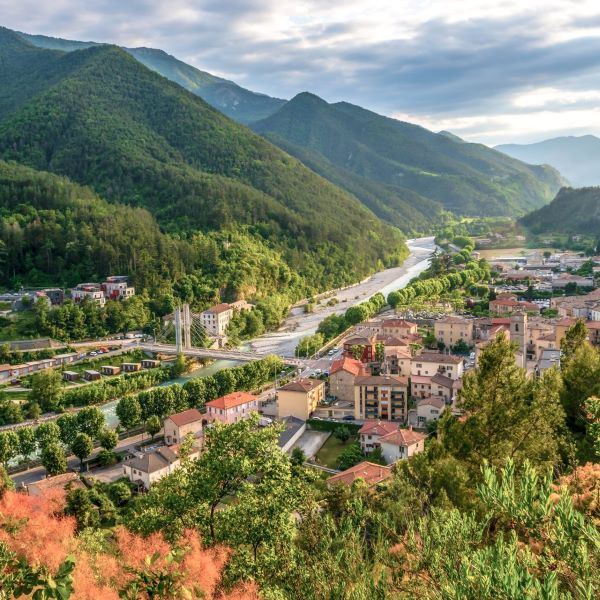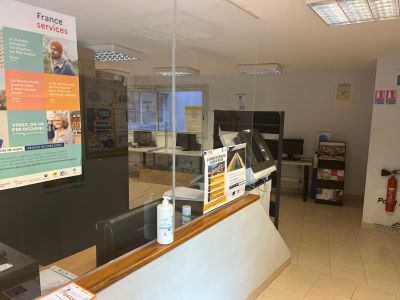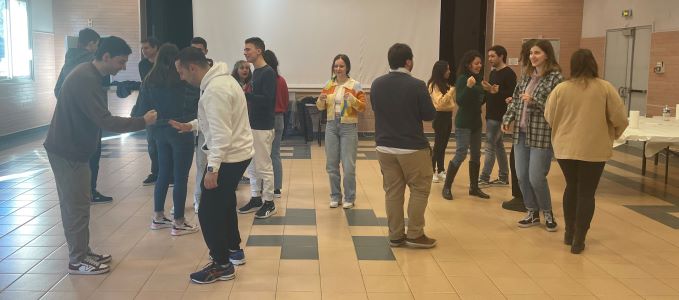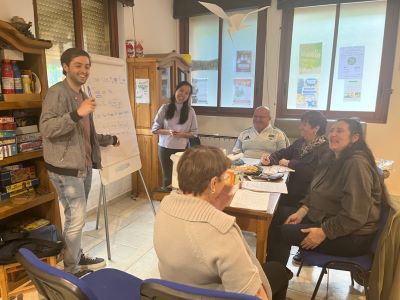CEPAGE RURAL COMMUNITY CENTRE: a structure providing integration and training, nestled in the heart of the Alps
This article is part of the EPALE European theme week focusing on: “Learning communities in rural settings”. This topic brings together initiatives from Austria, Belgium, Finland, France, Germany, Hungary and Poland.
The EPALE France team has chosen to focus on an organisation located in the south-east of France, not far from Italy: the CEPAGE rural community centre (“Foyer Rural”). For 35 years, this small centre has played a particularly important role in terms of local networking, inclusion of disadvantaged people, and European outreach.
A discussion with Claire Fernandez and Jean-Marc Dalmasso, directors of the CEPAGE centre.
EPALE : Claire Fernandez and Jean-Marc Dalmasso, could you introduce yourselves?
 |
My name is Claire Fernandez, I am the assistant director of the CEPAGE rural community centre. I am currently working more closely with the Europe department, but I also work with the social department and on the development of new projects. I will be taking over the management of CEPAGE after the retirement of Jean-Marc Dalmasso, the current director. |
 |
My name is Jean-Marc Dalmasso. Throughout my career, I have focused on local and rural development, which allowed me to participate in the creation of the rural community centre in 1987 and to take over its management in February 1995. I am now very close to retirement and am passing on the baton! |
The Cépage community centre is located in a rural area, in Puget-Théniers. What can you tell us about this area?
Puget-Théniers is a municipality of 2000 inhabitants located in the mountains (400m altitude), in the Haut-Pays Niçois region between Digne and Nice. Puget-Théniers is the central town of a community of 34 exclusively rural municipalities. This “valley capital” is home to many services and administrations: banks, a post office, police station, middle school, elementary school, a hospital and more recently a connected campus.
The area is fairly isolated, an hour's drive from the nearest major urban centre (Nice). Many people who are attracted by the lower rents compared with the French Riviera come to settle and are soon disappointed to find that the cost of living is quite high, as is the cost of transport to the coast. For this reason, there is a high turnover of residents.
However, the pandemic has sparked fresh interest in our territory and a steadily increasing population. In addition, the municipality has been selected to benefit from the national “Petite Ville de Demain” scheme promoting promising small villages, which will help us to receive support in the implementation of the territorial project. And the new municipal team is showing a strong desire to get things moving and commit to the future.

The centre was established in 1987. What values have guided this project since then?
CEPAGE is a French acronym for: Culture, Economy, Heritage (patrimoine), Animation, Study Group (groupe d’études).
The common factor that drives our broad range of activities is the desire to contribute to the rural development of Puget-Théniers.
Our values are those of the Popular Education movement: solidarity, cooperation, human fulfilment. Since the launch of the centre, we have worked to meet the expectations of the local population while unleashing new energies. We brought vocational training to a place where it didn’t exist before, we created new services when public services were more likely to close, we worked on equal opportunities between women and men at a time when this concept was still very abstract for many people, and we talked about Europe in areas that were rather closed to this idea. In short, we have shared some quite original views.
What are the main activities carried out by the centre?
The CEPAGE rural community centre is today composed of three departments:
1) The Public Services department: with national accreditation from “France Services”, the CEPAGE centre assists users in accessing their rights and online governmental services: family allowances, social security, vehicle registration, assistance in writing letters etc. We receive between 1,500 and 2,000 people each year, who come to us to ask about all aspects of everyday life (see below).
Regarding digital competences, we are also certified by the government (with “Espace Public Numérique” accreditation) and by the Regional Council (with “SudLabs” accreditation). Alltogether we work on reducing the digital divide, which is becoming increasingly problematic in rural areas.
The CEPAGE centre is certified by the French family allowance scheme (Caisse des Allocations Familiales), as a “Social Centre”. We also host partners: The Centre for Information on Women's and Family Rights, the Directorate General of Public Finance and a psychologist, among others.

2) Europe department: certified in 1995 as a “European Rural Crossroads”, the CEPAGE centre went on to act as a liaison for the European institutions until 2021 as a Europe Direct centre. The CEPAGE centre also works actively in the field of European cooperation. It is currently coordinating an Erasmus + youth project which aims to contribute to the empowerment of young people through the creation and independence of Medialab. It has also responded to the Citizens, Equality, Rights and Values (CERV) call for projects on European citizenship, as well as to an Erasmus + adult education call for projects to improve the employability of low-skilled adults.
The CEPAGE centre is also part of the European Solidarity Corps. Each year, it welcomes two European volunteers who are fully integrated in the activities carried out by CEPAGE but also develop their own actions such as intercultural cafés.

Training department: CEPAGE has been working in the field of adult education since its creation by responding to the needs of the population. As a result, we were awarded the “Espace Territorial d'Accès aux Premiers Savoirs” certification, in recognition of our contribution to providing locals with fundamental skills. CEPAGE, financed by the Regional Council, has provided tailored training to around one hundred adults and young people: basic skills in French and mathematics, English, various refresher courses, etc.
CEPAGE continues this training by teaching digital skills to adults.
What problems do you encounter in terms of providing training for adults?
We have a major problem, first of all, matching supply with demand. We need to take action on both levels: entrepreneurs need to be made aware of all the training possibilities within companies and jobseekers need to be made aware of the need to train before they find employment. The common point is training, not only in basic skills but also in the acquisition of technical skills necessary for the particular job. A course that meets both these requirements would be a good idea. For instance, targeting people with low qualifications.
For those who are qualified, there should be a tool that enables the two parties to meet quickly.
More than ever, we need to provide training in the local area and over the long term.
How do you recruit trainers?
Well, you have no idea how many people with a wide range of skills there are in the territory. We realised this a few years ago when we set up a popular rural university. Local people shared their knowledge and when we didn't have the skills locally, we went further afield to find them.
We did the same for our vocational training courses, first looking locally, then elsewhere, among our networks and partners.
Looking at the results, the returns to employment have always been satisfactory and the acquisition of new skills always beneficial for our trainees.
European outreach has always been part of your project. What do you gain from these European exchanges?
We were lucky to act as a liaison with the European Commission for rural territories, as a European Rural Crossroads, and this was a fantastic tool for exchanges. For example, I remember going to Corsica at the request of a member of the European Parliament for the inauguration of a Europe Centre, which allowed us to meet people, but also to discuss our work. Little by little a network is being formed at national level. But this network is not limited to France. It is also European, and we work together in our diversity. This is absolutely priceless!
There is also a second level, which is our work on European projects. This is how we have come to work on equal opportunities between women and men, on the fight against discrimination in rural areas, on INTERREG projects, on PRINCE projects and many others. Not to mention the Erasmus and European Voluntary Service projects and now the European Solidarity Corps.
It would take forever to list all the benefits this has brought us, but I will mention the discovery of other cultures, the exchange of ideas on local development, the sincere friendships, learning to work together, the desire to share projects, and discoveries.

Could you describe the Erasmus + cooperation project you have recently submitted (Adult Education)? Who are the partners, what are the objectives?
The aim of this Erasmus + strategic partnership project is to promote the professional integration of low-skilled people from rural areas and disadvantaged urban areas.
There are five partners:
-
- COOMPANION : a social enterprise cooperative in Sweden
- CICIA : a business incubator in Romania
- KNOWHERE: a coaching company in Italy
- RIGHT CHALLENGE : an association aiming to promote integration through employment in Portugal
- FR CEPAGE, a rural development association, France
To achieve this, we will create a compendium of resources as well as educational resources on the soft skills necessary for professional integration and on the basics of entrepreneurship. They will be available as MOOCs hosted on our respective websites.
We will also train trainers in the latest innovative methodologies in adult learning and publish a trainer's guide.
With the educational resources created and the trainers trained, we will set up two pilot courses in each country. One focusing on entrepreneurship, the other on the soft skills required in employment. We hope to train 150 people in total.
What initiatives would you like to launch or strengthen in the coming months?
We would like to strengthen the adult education centre as there is a real need in the area. However, this relies on us obtaining funding. In keeping with our identity, we need to turn to institutional partners, but also to the local structures that we have mentioned.
This is just the beginning, we must continue!





